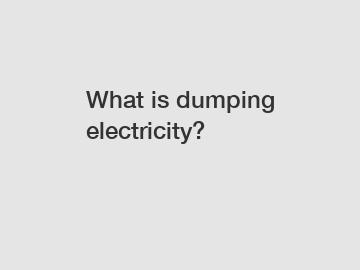What is dumping electricity?
What is dumping electricity?
Dumping electricity refers to the practice of selling electricity at a lower price in one area compared to its cost of production. This has been made possible due to the advancements in technology that have allowed electricity to be easily transmitted across regions. Dumping electricity occurs when surplus power is generated in one region and then transferred to another region where the demand is higher or the market price for electricity is higher. .
The concept of dumping electricity can be better understood by looking at the factors that contribute to its occurrence. Firstly, the generation capacity of power plants has increased significantly over the years, resulting in surplus electricity in some regions. This surplus power needs to be utilized or sold to avoid wastage. Additionally, the transmission and distribution infrastructure has improved, allowing electricity to be transported efficiently over long distances. Consequently, electricity can be easily transferred from regions with excess supply to those in need.

The economic impact of dumping electricity is notable. Firstly, it reduces the cost of electricity in areas that receive the surplus power. This benefits consumers as they are able to access electricity at lower rates. However, it poses challenges to the electricity market in the receiving regions. The local electricity suppliers, unable to compete with the lower prices offered by the surplus power, may struggle to remain profitable. This could lead to market consolidation and even the closure of smaller suppliers, resulting in reduced competition.
Dumping electricity also has environmental implications. Surplus electricity often comes from power plants that primarily rely on fossil fuels, contributing to greenhouse gas emissions and environmental pollution. By transferring this excess power to areas with higher demand, the environmental impact is spread unevenly. While it may enable the receiving region to meet its electricity needs without investing in additional power plants, it exacerbates the reliance on fossil fuels in the long run. This calls for a sustainable and balanced approach to the generation and distribution of electricity.
Mitigating the effects of dumping electricity requires careful consideration and planning. Firstly, it is essential to encourage the development and utilization of renewable energy sources to reduce reliance on fossil fuel-based power plants. Additionally, investment in energy storage technologies can help address the issue of surplus power by storing excess electricity during periods of low demand for later use. Furthermore, regulatory measures can be implemented to ensure fair competition and prevent monopolistic practices in the electricity market.
In conclusion, dumping electricity refers to the practice of selling surplus power at a lower price in regions with higher demand. It is enabled by improved transmission infrastructure and increased generation capacity. While it benefits consumers in receiving regions by reducing electricity costs, it poses challenges to local electricity suppliers and has environmental implications. Taking a sustainable approach and investing in renewable energy sources and energy storage technologies can help mitigate the effects of dumping electricity.
For more information, please visit dump truck manufacturer china, electric dump truck, electric powered dump trucks.


